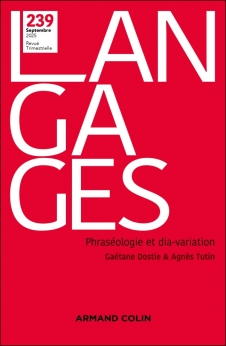
LANGAGES N° 239 (3/2025)
Pour acheter ce numéro, contactez-nous
Recevez les numéros de l'année en cours et accédez à l'intégralité des articles en ligne.
Dans la perspective théorique d’une sémantique unifiée des forces illocutionnaires et de leurs réalisateurs linguistiques, l’article propose l’analyse du sémantisme et des fonctions pragmatiques des marqueurs illocutionnaires phraséologiques du REMERCIEMENT et de leurs variations diaphasiques et diatopiques dans deux espaces francophones : le Québec et la France métropolitaine. Ces marqueurs incorporent et/ou explicitent la force illocutionnaire complexe et plurielle de cet acte, son degré de subjectivation, son intensité et/ou sa sincérité, activant dans l’interaction verbale différents éléments de sa représentation conceptuelle et sémantique, en fonction des contextes situationnels et des espaces culturels francophones. L’analyse s’appuie sur la triangulation de plusieurs données, principalement issues d’une recherche expérimentale.
From the theoretical perspective of a unified semantics of illocutionary forces and their linguistic realizations, the article proposes the analysis of the semantics and the pragmatic functions of the phraseological illocutionary markers of THANKS and their diaphasic and diatopic variations in two French-speaking spaces: Quebec and mainland France. These markers incorporate and/or explain the complex and plural illocutionary force of this act, its degree of subjectivization, its intensity and/or its sincerity, activating in the verbal interaction different elements of its conceptual and semantic representation, depending on the situational contexts and the cultural spaces of the French-speaking community. The analysis is based on the triangulation of several data, mainly from experimental research.